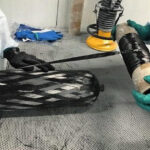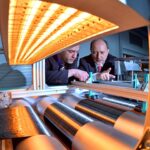The purpose of the event on 31 October-1 November was to provide participants access to information on federal markets for composites products and to advocate to grow defence and transportation markets for the composites industry. ACMA notes that in recent years composites have been used to protect US armed forces by providing low weight, strength and durability to aerial drones, armoured fighting vehicles, shelters, submarines and body armour. As a result of the fly in, ACMA anticipates protecting funding for R&D on composites applications and continued focus on the benefits of lightweighting military and civilian vehicles and aircraft. “As the voice of the composites industry, ACMA seeks to help our members in the composites business tell their story to officials whose policies directly impact them,” explains Tom Dobbins, ACMA President. “During our meetings on Capitol Hill, ACMA sent a strong message – that composite materials are best suited to keep our country safe and build vehicles that are more efficient and lightweight.” Rep. Joe Wilson (R-S.C.), the chairman of the Congressional Composites Caucus, kicked off the event by addressing how composites are transforming the defence sector. Sen. Joe Donnelly (D-Ind.), a former chairman of the Congressional Composites Caucus, expressed his admiration for the use of composites to improve ballistic applications such as bulletproof vests. Attendees at the event also had the chance to hear from federal agency officials to see how composites impact the strategic objectives of their agencies. The panel included Valri Lightner from the Department of Energy’s Advanced Manufacturing Office, Jeff Gilman from the National Institute of Standards and Technology (NIST), and Jen Vandenbrande from the Defence Advanced Research Projects Agency (DARPA). “By getting an opportunity to interact with these agency leaders, companies like ours have the opportunity to see some of the high-level government projects that involve composite materials,” says Peter Hedger Jr., Director of Marketing and Communications at Magnum Venus Products and Chairman of ACMA’s High Performance Council. “There are endless opportunities for ACMA members to raise their national profiles by helping drive government-funded innovation.” ACMA will be doing follow on webinars with several agencies that are providing market opportunities in composites. ACMA’s next policy fly-in, the third annual Infrastructure Day, will take place 7-8 February 2018. Registration will be open soon.













